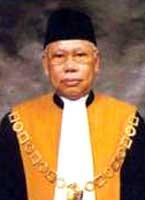
The great philosopher
Plato gives very important place to the idea of justice. He used the Greek word Dikaisyine for justice, which comes very near to the work 'morality' or 'righteousness', it properly includes within it the whole duty of man.
Chief Justice in this concept then should be a man with the work of morality. Bribery, meanwhile, is absolutely an immoral conduct. What about Indonesian Chief Justice Bagir Manan who would just turn 64 yesterday?
Yesterday, Harini R. Wiyoso, lawyer for the convicted businessman Probosutedjo, former president Soeharto’s half brother, admitted she gave US$500,000 to Supreme Court staffs that should be given later to Supreme Court Chairman and Chief Justice Bagir Manan.
“My client said that the money was for Mr Bagir,” said Firman Wijaya, Harini’s lawyer after the hearing at Corruption Eradication Commission.
Bagir is one of three judges reviewing Probosutedjo’s corruption case. Court had convicted Probosutedjo in April 2003 and sentenced him four years in prison. But in an appeal, higher court cut the sentence to two years. Probosutedjo also rejected the verdict and asking for judicial review by the Supreme Court.
Bagir denied strongly and said he has nothing to do with the bribery attempt. Harini and five Supreme Court staffs had been detained and named suspects in the case. It was the detained staffs who disclosed the bribery attempt early this week. (Read previous article on this)
In July, Supreme Court decided to reduce the prison sentence of the youngest son of Soeharto from 15 years to 10 years for multiple crimes, including ordering the murder of Supreme Court justice Syaifiuddin Kartasasmita.
Legal experts have criticized the decision saying there was no legal reason for the court to reduce sentence of Hutomo (Tommy) Mandala Putra. It was Bagir Manan who led the panel of five judges hearing Tommy’s request and defend the decision saying judges believed one of four charges against Tommy should not carry a penalty.
Judicial Commission chairman Busyro Muqoddas is worrying the bribery investigation would stop with the court staffs. “That’s why we will summon all judges in Probosutedjo case including Bagir,” he said.
The Probosutedjo bribery attempt case is hardly an exception to what Indonesian journalists call it court mafia. A World Bank and National Planning Board joint report, published in 1999, notes that a justice-seeker must pay a prohibitive bribe even when a complaint is filed. After a verdict is reached and the judge's sentence is passed, the warring parties must fork over more money for a written copy of the sentence.
In 2002, a law professor at the University of Indonesia published his findings on the hurdle of bribery, which waylays the justice-seeking process from the police station to the judge's office, and everywhere in between. He quoted what people commonly say when reporting a personal loss: "Reporting the loss of our chicken, we end up losing our goat." Such corruption is not merely a series of isolated incidents. Nowadays, there is imbedded in the judiciary a spider web of power capable of extortion without wielding a single weapon.
In 2002, Indonesia Corruption Watch, an especially active NGO, published a book detailing their investigation into the workings of this mafia. It is clear from their findings that even the highest court of law, the Supreme Court, is party to the "justice" trade.
Off-course we should reserve Bagir’s right of presumption of innocence. But we should audit his wealth as what we did three years ago. According to an audit report by Supreme Audit Agency in April 2003, Bagir has personal wealth of Rp678 million (US$68,000) that consisted of 1,490 square meter of lands in Bandung and Sumedang (both in West Java province), a house worth Rp246 million, four cars and prescious stones Rp361 million, and bank deposit of Rp71 million.
But in a report published by tokohindonesia.com disclosed his wealth as follows: Seven land spots in West Java and Lampung province with total 2,090 square meter, three cars, and Rp85 million of bank deposits at BNI and HSBC.
With take home pay of Rp20 million (US$2,000) per month it must be easy to count his wealth after four years in office. So far, no latest audit published for Bagir’s wealth. (Anybody have data on Bagir’s wealth?)
Born in Lampung, Sumatra in October 6, 1941, Bagir graduated from Law School of Padjajaran University in Bandung, master of comparative law from Southern Methodist University Law School, Dallas, Texas (1981), and PhD from Padjajaran University (1990).
Without any court experience, Bagir was appointed Chief Justice in 2001. It was Golkar Party, political machine of Soeharto during his 32-year authoritarian rule, which gave support for Bagir's nomination.
Labels: Bank BNI, SOEHARTO Inc
READ MORE!!!





